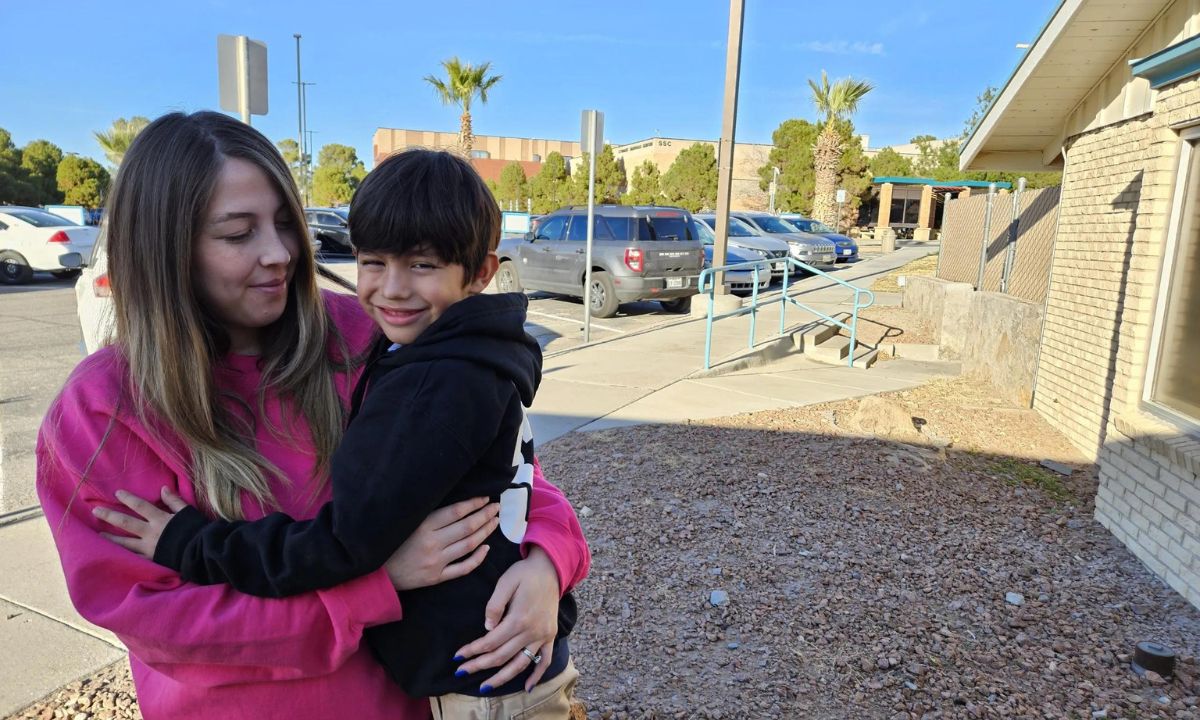New Family College to Benefit Two Generations of Texas Students
EPCC created Family College for parents who want to continue their education but cannot due to lack of child care options.

Get stories like these delivered straight to your inbox. Sign up for The 74 Newsletter
Michelle Soto knows how difficult it can be to find affordable child care.
The married mother of three young children, ages 7, 6 and almost 2, juggles her family responsibilities with math and writing classes at El Paso Community College to strengthen the English skills she will need to pursue her Associate of Applied Science degree in court reporting.
The 29-year-old Central resident attends classes at the Valle Verde campus while her older children attend Gen. Douglas MacArthur PK-8 School, and her younger son, Alan, stays at the campus’ YWCA Early Learning Academy. Soto would prefer not to attend school on weekdays or weekends to be with her family, but she said she would do it if necessary to complete her degree and start her career.
To address these kinds of situations, EPCC created Family College for parents, especially single parents, who want to continue their education but cannot because of a lack of child care options. The program, which launches this spring, allows EPCC students registered for courses on weeknights and Saturday mornings at the Valle Verde campus to enroll their children in a handful of free and fun age- or grade-appropriate classes taught by the institution’s Childrens’ College instructors.
Soto, who already signed up for spring classes that start Jan. 16, thought it was a good idea and said she would consider Family College as an option for the fall semester.
“It would be comforting to know that the college has something for the children,” she said before picking up Alan from the child care center. “It will help students to achieve their goals.”
For the spring semester, EPCC will offer six 90-minute courses for eight weeks for children ages 6 to 14. The classes will start at 5:30 p.m. Wednesdays (reading and Spanish) and Thursdays (computer use and gymnastics), and 8:30 and 10 a.m. Saturdays (math and ways to modify their own Minecraft video game). Most courses will be in Building B.
Such efforts will help families, according to research from Higher Learning Advocates, a national policy and advocacy group that supports efforts to help students. It shared recent data that student parents make up about 20% of students in post-secondary education, and 43% of them are single mothers. The group also reported that 44% of single mothers attend public two-year institutions.
In a Dec. 7 column in North Texas e-News, EPCC President William Serrata wrote about empowering student parents, which make up about 45% of the college’s enrollment without counting dual credit high school students. He mentioned several of the college’s efforts to accommodate student parents such as resource centers, flexible schedules and expanded child care partnerships.
Serrata cited the October 2023 announcement by Ascend at the Aspen Institute of its partnership with EPCC and three other community colleges from across the country to accelerate student-parent success. EPCC earned a two-year, $75,000 grant from the institute’s Postsecondary Leadership Circle Activation Fund to assist with its programs such as Family College. The collaboration also will include technical support.
“When student parents feel welcome and supported on campus, they are more likely to continue their studies and achieve their educational and professional goals,” Serrata said. “They become role models for their children, illustrating the value of education and creating a college-going culture, which will have a generational impact for years to come.”
EPCC has started to market Family College via fliers, social media, and in-person stops at community events to include campus visits in the Ysleta and Socorro independent school districts, said Leticia Guerra, EPCC director of Continuing Education – Business, Technology and Personal Enrichment, as well as a member of the Family College leadership team.
Guerra said that the decision to create this program was based on results of a spring 2021 student survey conducted by the Office of Institutional Research. It revealed that a large percentage of students were parents, and many were single parents.
“We want to make this a viable option for (student parents) so they can come to school,” Guerra said. “They can bring their child and know that they are in a safe environment getting a quality education and experience. It will give (student parents) peace of mind and, at the same time, allow them to continue their own education.”
Sandra Ornelas, an EPCC counselor for more than 14 years, said she has known many students who have needed to take a class here or there to finish their degree plan, but could not enroll because of work or family responsibilities.
“They might have benefitted from this program,” said Ornelas, another Family College organizer. “This option will allow them to come back and complete their degrees.”
EPCC officials have committed to this program through the fall 2024 semester. Program leaders will continue to monitor what works and tweak as needed. Among the metrics that officials will consider are student enrollment and outcomes. Depending on the level of success, the program could grow to other EPCC campuses.
“We’ll have to see if it’s truly going to be of value to the community,” Guerra said. “If it is beneficial, we can continue to institutionalize the program, but we have to take these steps first.”
This article first appeared on El Paso Matters and is republished here under a Creative Commons license.
Get stories like these delivered straight to your inbox. Sign up for The 74 Newsletter

